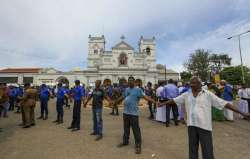Sri Lanka has ended the four-month-long state of emergency imposed in the country following the Easter Sunday attacks that claimed 258 lives.
Officials sources said a government gazette which should have been issued on Thursday to extend the state of emergency by a further month was not issued.
"The president did not issue the gazette to extend emergency," they said.
President Maithripala Sirisena has been extending the emergency through a gazette notification every month since the bombings on April 21.
Sri Lanka initially imposed the emergency on April 23 to crack down on the nine suicide bombers who attacked three churches and as many luxury hotels, killing 258 people and injuring 500 others.
The ISIS terror group claimed the attacks, but the government blamed the local Islamist extremist group National Thawheed Jammath (NTJ) for the Ester Sunday bombings.
The state of emergency gives sweeping powers to the security forces to arrest and detain people in the aftermath of the attack.
Over 1,000 people were arrested for their links to the NTJ, including five people who were extradited from Saudi Arabia.
The tourism industry has been lobbying extensively to lift the state of emergency as it saw a surge in tourist cancellations.
The government initiated several high-level probes to investigate the security lapses which led to the attacks despite prior intelligence warnings.
ALSO READ: Easter Sunday attack suspects should be hanged: Sri Lankan President
ALSO READ: 176 children lost their parents in Easter Sunday attacks: Cardinal Ranjith
ALSO READ: Sri Lanka reconsecrates St Sebastian's Church damaged in Easter Sunday blasts
Latest World News

